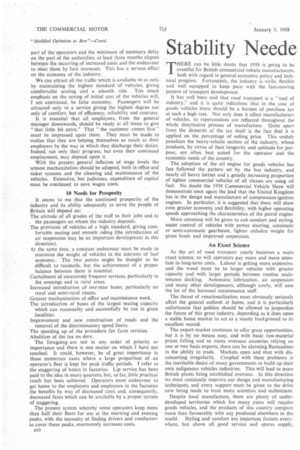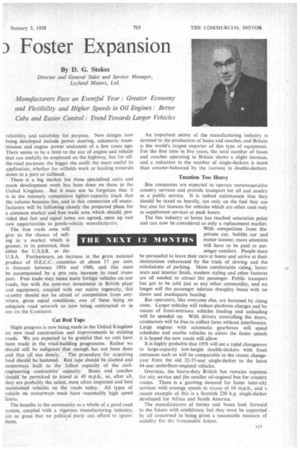Stability Neede
Page 44

Page 45

If you've noticed an error in this article please click here to report it so we can fix it.
) Foster Expansion
THERE can be little doubt that 1958 is going to be eventful for British commercial-vehicle manufacturers. both with regard to general economic policy and technical progress. Fortunately, the industry is virile, flexible and well equipped to keep pace with the fast-moving pattern of transport development.
It has well been said that road transport is a "tool of industry," and it is quite ridiculous that in the case of goods vehicles there should be a burden of purchase tax at such a high rate. Not only does it affect manufacturers of vehicles, its repercussions are reflected throughout the whole distributive process of manufacture. Quite apart from the demerits of the tax itself is the fact that it is applied on the percentage of selling price. This unduly penalizes the heavy-vehicle section of the industry, whose products, by virtue of their longevity and aptitude for purpose, are often best suited for the operator and the economic needs of the country.
The adoption of the oil engine for goods vehicles has fast followed the pattern set by the bus industry, and nearly all heavy lorries and a greatly increasing proportion of lighter commercial vehicles of all classes are using oil fuel. No doubt the 1458 Commercial Vehicle Show will demonstrate once again the lead that the United Kingdom has in the design and manufacture of compression-ignition engines. In particular, it is suggested that these will show even greater economy and flexibility, with higher operating speeds approaching the characteristics of the petrol engine.
More attention will be given to cab comfort and styling. easier control of vehicles with power steering, automatic or semi-automatic gearboxes, lighter unladen weight for given loads and improved suspension.
An Exact Science
As the art of road transport yearly becomes a more exact science, so will operators pay more and more attention to long-term costs. Labour is getting more expensive, and the trend must be to larger vehicles with greater capacity and with larger periods between routine maintenance docking. Automatic lubrication, air suspension and many other developments, although costly, will ease (he lot of the harassed maintenance staff.
The threat of renationalization must obviously seriously affect the general outlook at home, and it is particularly unfortunate that politics should be allowed to jeopardize the future of this great industry, depending as it does upon a stable home market to act as a steady background to its excellent record.
The export market continues to offer great opportunities, but it is by no means easy, and with basic raw-material prices falling and so many overseas countries relying on one or two basic exports, there can be alarming fluctuations in the ability to trade. Markets open and shut with disconcerting irregularity. Coupled with these problems is the inevitable desire of many governments to build up their own indigenous vehicles industries. This will lead to more British plants being established overseas. In this direction we must constantly improve our design and manufacturing techniques, and every support must be given to the drive now being made to train more scientists and technicians.
Despite local manufacture, there are plenty of underdeveloped territories which for many years will require goods vehicles, and the products of this country compare more than favourably with any produced elsewhere in the world. Styling and comfort are important factors everywhere, but above all good service and spares supply, reliability and suitability for purpose. New designs now being developed include power steering, automatic transmission and engine power undreamt of a few years ago. There seems to be a limit to the size of engine and vehicle that can usefully be employed on the highway, but for offthe-road purposes the bigger the outfit the more useful its application, whether for oilfields work or hauling minerals down to a port or railhead.
There is a big market for these specialized units and much development work has been done on them in the United Kingdom. But it must not be forgotten that it is in the intensely competitive lighter-capacity truck that the volume business lies, and in this connection all manufacturers will be following closely the projected plans for a common market and free trade area which should, pro. vided that fair and equal terms are agreed, open up vast new opportunities to goods-vehicle manufacturers.
The free trade area will give us the chance of selling in a market which is greater, in its potential, than either the U.S.S.R. or the U.S.A. Furthermore, an increase in the gross national product of 0.E.C.C. countries of about 17 per cent. is forecast between 1956 and 1960, and this must be accompanied by a pro rata increase in road transport. Free trade may mean more foreign vehicles on our roads, but with the post-war investment in British plant and equipment, coupled with our native ingenuity, this ccuntry should not be afraid of competition from anywhere, given equal conditions, one of these being an adequate road network as now being contructed or in use on the Continent.
Cut Red Tape
Slight progress is now being made in the United Kingdom on new road construction and improvements to existing roads. We are expected to be grateful that no cuts have been made in the road-building programme. Rather we should still be indignant that enough has not been done and that all too slowly. The procedure for acquiring land should be hastened. Red tape should be slashed and motorways built to the fullest capacity of the civilengineering contractors' capacity. Buses and coaches should be permitted to travel at 40 m.p.h., as, after all, they are probably the safest, most often inspected and best maintained vehicles on the roads today. All types of vehicle on motorways must have reasonably high speed limits.
The benefits to the community as a whole of a good road system, coupled With a vigorous manufacturing industry, are so great that no political party can afford to ignore them.
An important sector of the manufacturing industry is, devoted to the production of buses and coaches, and Britain is the world's largest exporter of this type of equipment. For the first time in five years, the total number of buses and coaches operating in Britain shows a slight increase, and a reduction in the number of singlc-deckers is more than counter-balanced by the increase in double-deckers.
Taxation Too Heavy
,Bus companies are expected to operate unreinunerative country services and provide transport for all and sundry as a public service. It is indeed unfortunate that they should be taxed so heavily, not only on the fuel they use but also for licences for vehicles which are often used only to supplement services at peak hours.
The bus industry at home has reached saturation point and can now be considered as only a replacement market. With competition from the private car, bubble car and motor scooter, more attention will have to be paid to pas senger comfort. People must be persuaded to leave their cars at home and arrive at their destinations unharassed by the trials of driving and the tribulations of parking. More comfortable riding, better seats and interior finish, modern styling and other features are all needed to attract the passenger. Public transport has got to be sold just as any other commodity, and no longer will the passenger tolerate draughty buses with no doors and inadequate heating.
Bus operators, like everyone else, are harassed by rising costs. Larger vehicles will reduce platform charges and by means of front-entrance vehicles loading and unloading will be speeded up. With drivers controlling the doors, conductors will be free to collect fares without interference.
Large engines with automatic gearboxes will speed schedules and enable vehicles to attain the faster speeds it is hoped the new roads will allow.
It is highly probable that 1958 will see a rapid changeover to large-capacity low-height double-deckers with front entrances such as will be comparable to the recent changeover from the old 32-35-seat single-decker to the latest 44-seat underfloor-engined vehicles.
Overseas, the heavy-duty British bus remains supreme for city service and the smaller oil-cngined bus for country routes. There is a growing demand for faster inter-city services with average speeds in excess of 60 m.p.h., and a recent example of this is a Scottish 230 h.p. single-decker developed for Africa and South America.
The manufacturers of lorries and buses look forward to the future with confidence, but they must be supported by all concerned in being given a reasonable measure of stability for the foreseeable future.




































































































